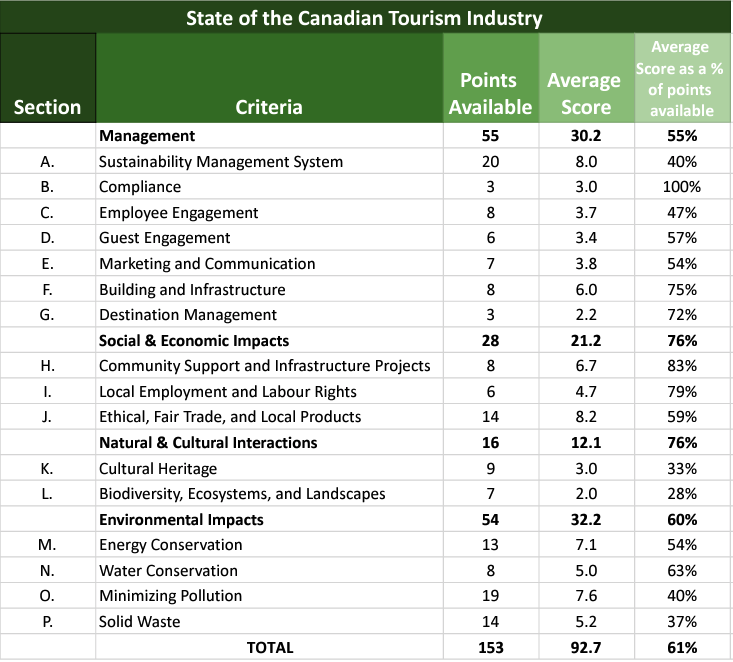Sustainability has increasingly become an important value for visitors and is a key component of successful tourism businesses and a thriving tourism industry. In 2021, GreenStep launched the Sustainable Tourism 2030 Pledge in partnership with the Tourism Industry Association of Canada, encouraging tourism businesses and destinations across the country to measure their sustainability performance using the free online Sustainability Score assessment based upon the Global Sustainable Tourism Council (GSTC) criteria, and to make a commitment to improving this performance each year until 2030.
With hundreds of tourism businesses across Canada now having taken the Sustainability Score assessment, the Sustainable Tourism Dashboard enables anonymous aggregation of the results to help tourism destinations, policy makers, and other industry stakeholders understand how the tourism industry is performing at a local, provincial, national, and eventually international level.
The assessment for tourism operators includes 87 questions and over 100 indicators to help tourism businesses measure their sustainability performance across four main categories; Management; Social and Economic, Natural & Cultural, and Environment. They are then further broken down into 16 subcategories, all of which are based upon the GSTC criteria and aligned with the UN Sustainable Development Goals.
The table below demonstrates how the Canadian tourism industry is performing based upon the aggregate score of the more than 100 businesses included in the preliminary dataset, compared to the total points available in each subcategory. This allows for insight into where the industry is doing well, and where there is the most room for improvement.

Looking at the subcategories where the industry has scored less than 50%, it is clear that tourism businesses across Canada need support in six key areas. To help provide further insight into what these scores mean, each subcategory is further broken down below:
- Employee Engagement – Looks at how staff is engaged with the development and implementation of the sustainability management system and that they receive periodic guidance and training regarding their roles and responsibilities in its delivery.
- Cultural Heritage – Includes cultural interactions, protecting cultural heritage, and presenting cultural heritage with a focus on respecting the intellectual property rights of local and indigenous communities.
- Biodiversity, Ecosystems, and Landscapes – Looks at how the industry supports biodiversity conservation, protects against the introduction and spread of invasive species, manages and promotes visits to natural sites, manages interactions with wildlife, supports animal welfare in tourism, and the regulation of wildlife harvesting and trade.
- Solid Waste – Looks at ensuring that waste, including food waste, is measured and mechanisms are in place to reduce, reuse, and recycle, ensuring that waste disposal does not have adverse effects on local populations or the environment.
- Sustainability Management System – Considers if the organization has implemented a long-term sustainability management system that is suitable to its size and scope, addresses environmental, social, cultural, economic, quality, human rights, health, safety, risk, and crisis management issues, and drives continuous improvement.
- Minimizing Pollution – focuses on the measurement and reduction of direct and indirect greenhouse gas emissions and other forms of pollution.
For the Canadian tourism industry to boost our performance and profile as a sustainable tourism destination, destinations and government must provide further support to help the industry improve in these areas through ongoing assessments to track results, as well as education, training, and hands-on guidance for tourism operators. These measures will help build capacity and resiliency into the industry, while also speeding our collective recovery from the impacts of the pandemic.
Several free resources to support industry and destinations on this path can be found on the GreenStep Sustainable Tourism Blog, as well as recordings of past webinars on the events page.
This post also appeared on the Tourism Industry Association of Canada.

